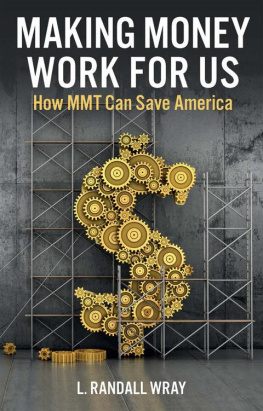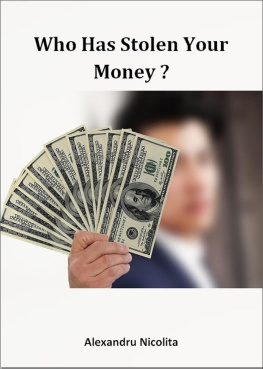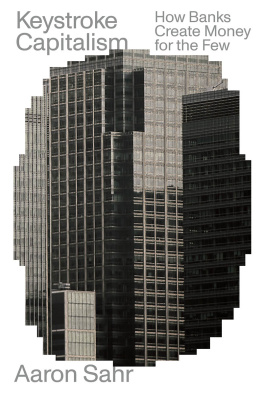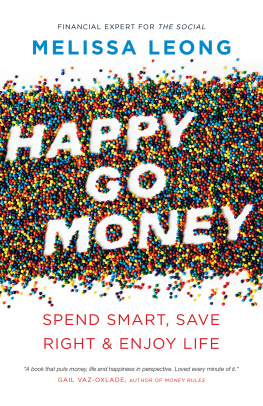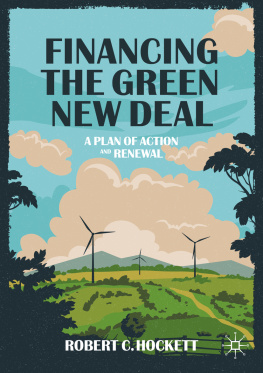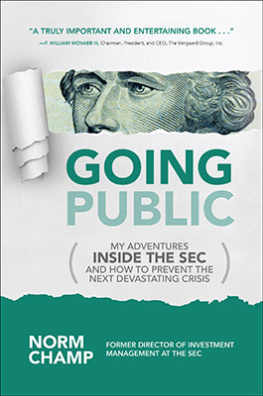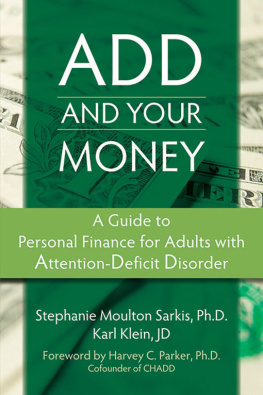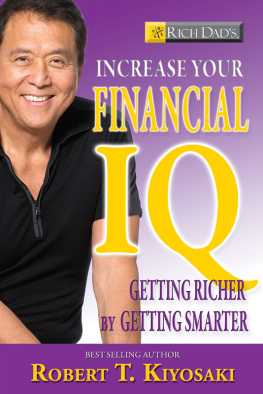PREFACE

Youve always had the power, my dear, you just had to learn it for yourself.
Glinda, the Good Witch of the North, The Wizard of Oz (1939)
You probably saw the movie version of The Wizard of Oz as a kid, as so many of us did. You might even recall the crucial line just quoted, which comes in the storys culminating scene. Glinda, the Good Witch, is explaining to Dorothy what her long ordeal (being swept away by a great storm from her home in Kansas) could possibly mean.
The big lesson is: Youve had the power to go back to Kansas all alongby tapping your shoes together. You merely didnt realize it. So you had to learn it for yourself. But you can empower yourself, now, by understanding what youre capable of.
That sounds like a message of female empowerment, and it may well have been. But today we often forget that the film, based on a childrens book by L. Frank Baum, is ultimately a parable about money. Baum was not only a one-time actor and the author of numerous tales about the land of Oz, an imagined American utopia, he was also a political activist who once owned a newspaper. The story we think we know so well was responding to the economic crises of his day.
This book is not a parable, but if it has a big thesis, its that we still havent taken Glindas (and Baums) lesson to heart, even a hundred years later. The lesson is: Although we Americans have suffered through financial crises, weve had the power to take control of our money all along. But we havent fully realized how it can help heal our society. Now the time has come to empower ourselves by understanding what were capable of.
Really? The Wizard of Oza neglected tract of political philosophy, the key to future prosperity and maybe to saving the republic? Yup. Just think back to that famous scene when Dorothy and Co., having followed the yellow brick road, finally arrive at the Emerald City. The great wizard is putting on an awesome spectacle. Suddenly, Toto the dog pulls back the curtain, revealing a coy, bumbling man conjuring with smoke and mirrors. We now use pulling back the curtain as a clich for unveiling or unmasking. Weve largely forgotten what the original parable was pulling back the curtain on.
When Baums book was published in 1900, it was meant to expose the gold standard as an illusion. There was no yellow brick road, paved in golden rocks, to a green Emerald City of shared prosperity. That was always mythology, so much propaganda.
Just recall the main characters. Who was the bumbling Wizard of Oz behind the curtain (oz. meaning ounce, which is of course the unit of measure for precious metals)? Government officials of the day.
Who were the Wicked Witches of the East and West? The bankers of the East and West Coast cities, who propagated the gold myth for private profitprofit that came at the expense of the great hinterland.
And the Cowardly Lion? The political class and intellectuals that let the bankers have their way.
What about the Tin Man without a heart? The industrial workers in the cities, who never aligned with the farmers.
Who, then, was Dorothy? A daughter of the Midwestern farm families, who suffered under a recession and wave of home foreclosures in the 1890s. The recession was the great cyclone that swept Dorothy from her home in Kansas.
If this isnt obvious, consider the crises of Baums day, the ones he lived through. By 1900, the American economy had been starved of money decade after decade. That was the whole point of the gold standard, after allto limit the supply of money to the scarce supply of certain specific yellow rocks dug up from the ground. So when the gold diggers out west or in Australia or South Africa had a bad year, well, there just wasnt going to be enough money for a growing economy. That brought what economists call deflation, or too little money chasing too many goods, and thus economic contraction in the Midwest. Farmers outside of the big cities, in Kansas for example, were hit hardest.
The early American colonies were short on precious metals, so they used book credit, paper called scrip, and even tobacco or shell beads as moneys. Then the founders of the post-Revolutionary republic took over and declared a new unit of account, the dollar, officially tying it to both gold and silver. But in practice it was often the one or the other, depending on what metal was available. During the Civil War, paper money greenbacks were issued with no strict connection to either gold or silver, as Treasury bonds were now deemed to be good as gold. To a degree that seems strange to us now, by the mid- to late-nineteenth-century major political movementsthe Greenbackers and then the free silver menfeverishly organized around monetary policy decisions. It was a coinage act later called the crime of 1873, which gave us what we now call the gold standard, that would eventually draw particular ire. Word had it that London and New York bankers such as the Rothschilds and the Morgans had duped gullible congressmen to demonetize silver in last-minute, dead-of-night legislation. And so, during the cycle of depressions that followed, distrust and suspicion only heightened. By 1896, William Jennings Bryan, the loudmouthed populist US representative from Nebraska, condemned the exclusive tie to gold in what some regard as the most famous speech in American history. You shall not press down upon the brow of labor this crown of thorns. You shall not crucify mankind upon a cross of gold, he thundered.
Bryan was an unsubtle man with a serious proposal, in line with what Americans had done in the past when they turned to shells, scrip, and other forms of currency: if there arent enough dollars out there, just issue more of them, now backed by silver alongside gold. Baum, a progressive former journalist and early feminist, well aware of the politics of his era, seemed to agree. In his original story, Dorothy wore a


